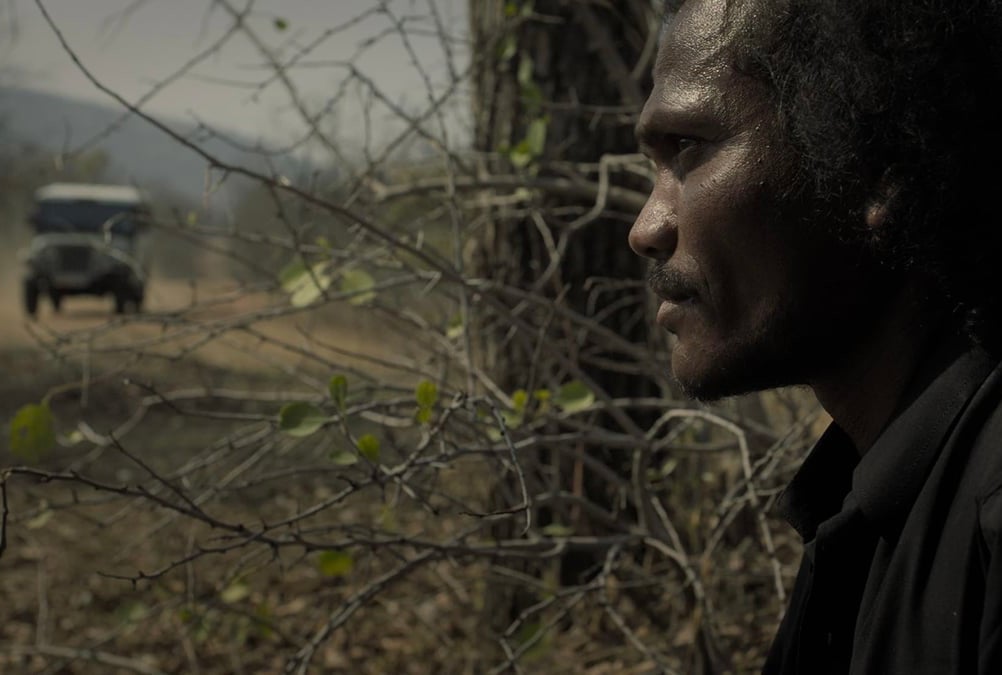Chhatrapal Ninawe’s debut venture, Ghaath (Ambush), finally hits theaters across Maharashtra after being screened in the Panorama section of the 73rd annual Berlin International Film Festival held in 2023 . The film is an effective psychological thriller revolving around the power play between Maoist rebels and police forces and its catastrophic impact on civilian lives in rural Maharashtra.
Ghaath flows non-chronologically within a triptych-like structure that weaves its storylines in and around the Deori village of Maharashtra. In the first part, Zameen, we see Falgun (Dhananjay Mandaokar), a guerrilla fighter of a Maoist group, who is hiding after a fatal attack on their group. He lives in a hut and works in a sawmill. He studies the movements of Assistant Commissioner of Police, Amit Nagpure (Jitendra Joshi), daily with the intent to kill him. Nagpure is accused of killing the gang’s leader and Falgun’s elder brother, Raghunath (Milind Shinde), in an encounter. In the second part, Jal, we learn that Nagpure is stuck in that village, away from his wife and daughter. His only means of escape is through a transfer by getting a Maoist to surrender, as government policy dictates. Nagpure is unable to find one and his days are spent mostly with him being steeped in alcohol. In the third segment, Jungle, we examine Raghunath’s disillusionment when a close colleague of his gets killed by another member of the group for alleged embezzlement of funds. It shakes his faith in the organization’s transparency as he begins to doubt the very values and principles he once fought for…
Ghaath works more as a character study and does not make much of an attempt to go deep into political analysis or provide social commentary on the intricacies of the Maoist cause. The three men in the film are all victims of their circumstances, chained together in an eternal cycle of violence, moral dilemmas, and conflicting loyalties. Falgun is a loyal Maoist bent on getting revenge from Nagpure for killing Raghunath. However, he is unaware that the latter had better plans of resurrecting his life. Raghunath has faked his own death and hidden the money meant for the group to free himself from the constraints of the movement and begin life anew. Meanwhile, Nagpure is trapped in a downward spiral of frustration and despair, growing increasingly willing to take ruthless steps to achieve his goal. To escape his ordeal, he seeks refuge on an island, where he encounters an indigenous man living in isolation and surviving on whatever nature provides, Perku, who ultimately becomes the symbol of hope for the three men to see purity and simplicity amidst their corrupt and violent life.
In a world where men dominate the rules of society, thankfully, women do not play a secondary role in shaping the course of events. Nagpure’s wife frequently questions him over the phone regarding his attempts to get transferred. The pangs of separation from his wife and daughter drive him to take drastic measures. At the same time, Kusari (Suruchi Adarkar), a tribal woman who is powerless in societal terms, asserts her agency and influences decisions by challenging traditional power dynamics. She refuses to be reduced to an object of male desire and though undoubtedly fearless, she still undergoes abuse, embodying both resilience and the hard truths faced by marginalized communities.
At nearly 120 minutes, parts of the film feel stretched as it enters its third segment and delves into the activities of the Maoists. Raghunath’s developing affection for Kusari seems to lack the required buildup. The biggest shortcoming, though, are the film’s action and shootout scenes. They fall flat, diluting the impact needed to shock the viewers truly. As a result, we sometimes distance ourselves from the narrative and fail to stay emotionally engaged throughout.
Jitendra Joshi, as Nagpure, skillfully portrays the inner conflicts of a police officer trapped in a conflict zone with no escape. Milind Shinde delivers a compelling performance as Raghunath, an immoral yet cornered soul caught between the revolution and his ambitions. Dhananjay Mandaokar brings a naturalistic depth to Falgun, a character unwavering in his commitment to the Maoist cause, even in the face of adversity. Janardan Kadam, as Perku, plays his role with innocence and spontaneity, at times seeming almost surreal, yet always convincing. Suruchi Adarkar imbues Kusari with the perfect blend of power and dignity.
The cinematography by Udit Khurana possesses a simplicity that captures the tonal variations of the characters effectively, allowing them to brim with emotion. His framing of the lush island and dense jungle integrates seamlessly with the story, never overwhelming or overshadowing the narrative. Navnita Sen’s editing allows the narrative to progress smoothly and steadily. She avoids relying on typical fast cuts to create tension and in scenes like where Falgun chases Nagpure’s jeep, her controlled tempo contributes to the film’s urgency as it maintains perfect harmony within the non-linear structure of the story. The sound design by Manoj Goswami is restrained and balanced while Madhur Padwal’s background score is apt as it captures the personal anguish and remorse within the story.
Ghaath is an ambitious first film that carefully addresses the issue of the ‘civil war’ raging in central India for decades from the perspectives of its central characters. It is an impressive enough directorial debut for Ninawe, making one eager to see what he comes out with next.
Marathi, Thriller, Drama, Color


